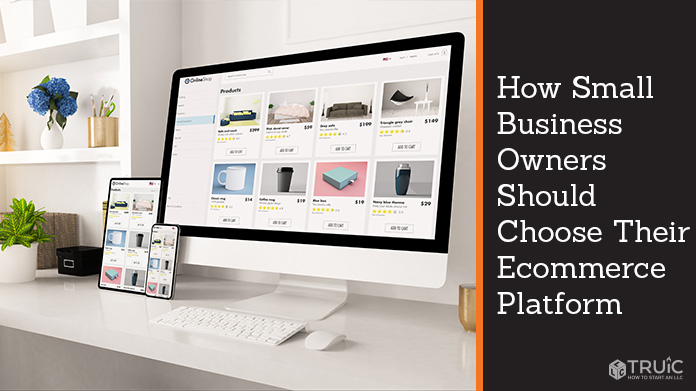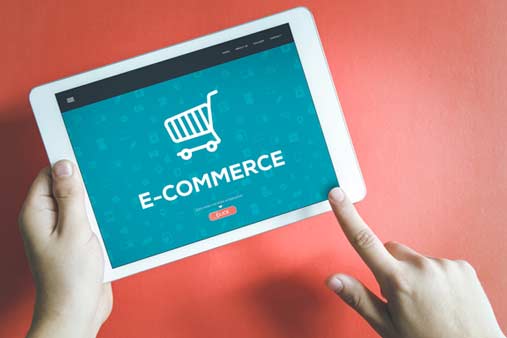Why Small Businesses Need Ecommerce
In today’s modern age, very few small businesses can survive without an online presence. Even if you run a local store, you’ll still need a business website with online offerings.
More and more website builders are making adding ecommerce to a business website a simple process. Just about anyone can tap into the booming ecommerce market. Read on to see how to add ecommerce tools to your online business.
Make sure your website builder has everything you need to add ecommerce. Check out our Best Website Builder guide to learn more.

The Rise Of Ecommerce and Small Business
Online sales have seen a steady increase over the past few years. More and more people are turning to online shopping to fulfill a need and tap into a moment of luxury. And with in-person retail sales on a steady decline, it behooves any small business owner to explore ecommerce options.
The rise of ecommerce is a natural outcome of technological developments. Advances in digital technologies and the advent of social media has meant that many of today’s consumers are comfortable completing a variety of transactions online.
Personal mobile phones are now a shopping tool that can be used to research products, compare prices, and place orders. The average digital shopper can buy from around the world, choosing from a vast universe of independent websites and online marketplaces. An equally extensive logistic network supports this online activity. The global shopper can have their purchases delivered to their home, no matter where they live.
Small Businesses and Online Stores
Gaining access to this huge market, which is set to grow, means going online. A website or other online presence also offers an opportunity to have access to tools that brick-and-mortar establishments never have. For example, when someone visits a website, they leave a trail of data that tells you something about who they are. If a purchase is made, even more information about the person is revealed. This is data that could help in planning promotions, stocking products, and in many other ways. Additionally, it’s automatically recorded and can be viewed at any time. These are opportunities that a physical store simply does not have.
But, how do you know which online option is best for you? The answer to that question should become clearer by describing what to expect from an ecommerce platform and what the best ones offer.
What Is an Ecommerce Platform?
At its most basic, an ecommerce platform is simply an online tool that allows a store owner to display images of products and accept orders and payments. But, most ecommerce platforms currently available do much more than that. They offer ways of collecting data about visitors to a site. They also provide a host of ancillary tools that, together, amounts to a business command center, from which different aspects of a business — inventory and marketing, for example — can be monitored and controlled.
Types of Ecommerce Platforms
Ecommerce platforms come in three basic flavors: self-hosted, hosted by a service provider, and listing on a marketplace.
Looking for the best ecommerce platform? Be sure to read our review of the Top 7 Best Ecommerce Platforms.
Self-Hosted
Self-hosting means you build your own website and rent space from a hosting provider. Typically, this will require the services of a website designer or other IT specialist. The bottom line is that the responsibility for updates, maintenance, and bugs is yours. This may be more than you catered for.
Typically, many self-hosting platforms are open source and use a third party to host your website data. The costs from third-party hosting services tend to be structured in tiers, with varying levels of technical support. Naturally, the least expensive plans get the least support. This can be a problem. Running a promotion that boosts traffic may bring your site down because that level of activity requires more technical backup, which your budget plan doesn’t cover.
Want to find affordable ways to get your ecommerce store up and running? Be sure to check out our guide to the Best Cheap Ecommerce Builders.
Hosted
The obvious solution to the difficulties you’re likely to encounter in self-hosting is to sign up with a provider, like Shopify or Wix, that offer website design as well as a hosted platform. These platforms let you have your own branded unique site. They are relatively easy to set up and don’t require a great deal of technical expertise. As such, most business owners won’t feel the need to hire a specialist unless they want to add sophisticated capabilities or design to their sites.
Marketplace Listing
Listing on a marketplace, like Amazon, is another option. However, there are a number of caveats you should bear in mind. First, though, the good stuff – Amazon is a huge marketplace visited by millions of consumers from around the world. Its advantage is that it offers unmatched exposure and visibility. Your products are likely to get, at least, a few hundred or a few thousand of those visitors.
Also, these marketplaces generally operate in many markets, which makes the world your oyster. They expand the reach of your business beyond its geographical location. Buyers in the most remote parts of the globe may discover what your store is offering.
A valuable feature of online marketplaces is that consumers generally use them to look for products rather than brands. This increases the chance of attracting new and unique customers after they discover just one product you sell. Afterward, these customers may be tempted to visit your site in the future.
However, competition on the largest marketplaces is intense. These platforms host hundreds of thousands of sellers, so a large number of these sellers are likely to be your direct competitors.
Final Word
Selling online is no longer an option. The virtual retail world continues to grow at a rapid pace. Indeed, more and more consumers are viewing online and in-person shopping as simply two ways to buy, choosing whichever way better suits them at the time. Merchants who make it easy for them to do so by establishing an online presence are likely to win the sale.
Recommended: Use our How to Build a Website guide to learn how easy it is to enter the online sales market.


